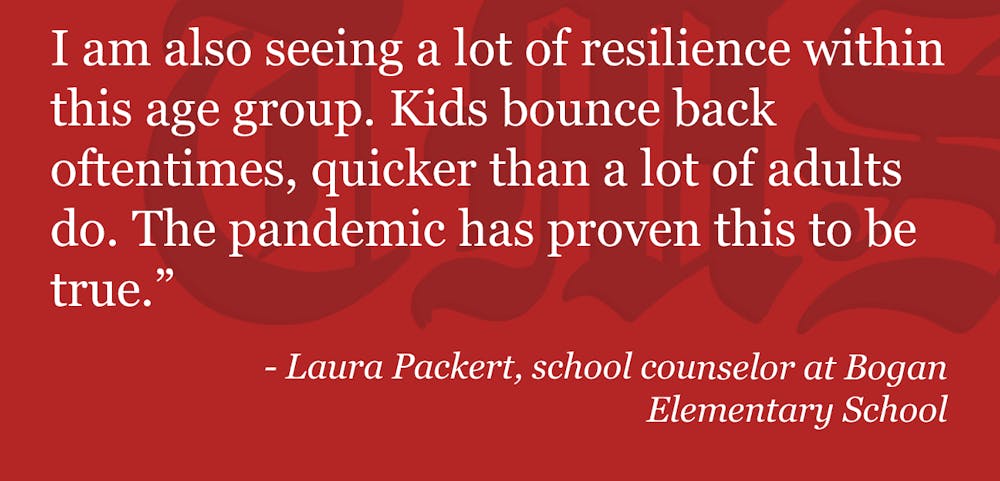Each year, two doctoral candidates in Miami University’s psychology department spend 20 hours a week providing counseling and education about mental health to students in the Talawanda School District.
Jennifer Green is a clinical professor and the coordinator of the clinical traineeship, a program which operates within Miami’s Center for School-Based Mental Health Programs. She said the psychology department’s partnership with Talawanda began 20 years ago and is funded by a grant from the Oxford Community Foundation.
Green said the participating doctoral candidates are selected to participate through an application process and screening by Talawanda staff. One student each year focuses on elementary school students, and the other is assigned to Talawanda High School.
“[The trainees] are supported every day by the school counselors and the school psychologists,” Green said. “We also make it very collaborative … We try to be very respectful that the school setting has its own culture and rules and the way that it does things.”
Katelyn Wargel is a graduate student in clinical psychology and the clinical trainee at Bogan Elementary School. She said she decided to pursue the program because of how it aligns with her professional goals.
“My interest in doing research and work is through school-based mental health,” Wargel said. “Every year, the clinical psychology program has two students who work in local schools providing mental health services, so through that connection I was able to work in that role this year.”
Wargel meets with students one-on-one every week to talk through their current struggles or emotions. When school started in the fall, the students were all remote, so she got to experience the transition to in-person learning with them.
“Kids were just really needing that in-person [format] to be with their friends or see more structure or just not sit in front of a screen for six hours of the day,” Wargel said. “But that being said, some kids, especially depending on the messages they got about COVID, were really really anxious and worried about coming back to school.”
Child therapy typically involves hands-on activities like drawing or using figures. Wargel said it was hard at first to adapt these practices to an online environment, but she eventually got used to using shared screens to get her clients to engage.
Not every change brought on by virtual counseling was negative. Wargel said it was sometimes helpful to have parents involved with her sessions on the other side of the screen.
Now that Bogan is offering in-person instruction, Wargel holds a small group session with some kids to help them navigate social situations.
“I also run just one small group of kids that works on social skills and kind of helping them become more integrated in the classroom and in the school,” Wargel said. “They eat lunch with me once a week, so that’s really fun.”
Enjoy what you're reading?
Signup for our newsletter
Laura Packert is a school counselor at Bogan Elementary School. She wrote in an email to The Miami Student that while the pandemic has made mental health a priority for many families, the young students she works with are handling the stress well.
“I am also seeing a lot of resilience within this age group,” Packert wrote. “Kids bounce back oftentimes, quicker than a lot of adults do. The pandemic has proven this to be true.”
Packert said the partnership with Miami has been able to provide services to families that Talawanda wouldn’t be able to provide on its own. Even though the program has had to adapt to the pandemic, she said families love being able to connect with young mental health professionals on an individual level.
The partnership also helps offset students’ costs for mental health services. Green said that because the Oxford Community Foundation provides funding for the mental health trainee program, they are able to offer their services free of charge and without insurance.
“There’s just no barriers to that treatment,” Green said. “And we do know that there’s a lot of families where parents are working … and the ability to take their child to a therapist or to an appointment every week is just too much. They just can’t do it, and so having something right there is really beneficial.”
Packert said she hopes the program continues to teach students necessary topics in mental health and wellness.
“We are all teachers of social emotional learning, and we teach simply in our living,” Packert wrote. “How I live, how I interact with my peers, how I respond to a student … kids are watching. They are learning. They are modeling. Teaching empathy and social skills is pivotal.”




